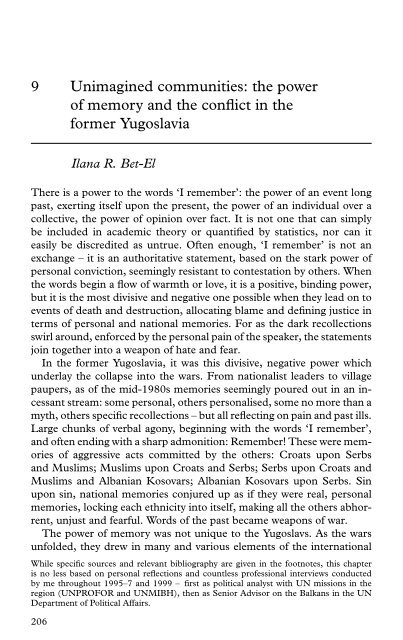Memory and Power in Post-War Europe: Studies in the Presence of ...
Memory and Power in Post-War Europe: Studies in the Presence of ...
Memory and Power in Post-War Europe: Studies in the Presence of ...
You also want an ePaper? Increase the reach of your titles
YUMPU automatically turns print PDFs into web optimized ePapers that Google loves.
9 Unimag<strong>in</strong>ed communities: <strong>the</strong> power<br />
<strong>of</strong> memory <strong>and</strong> <strong>the</strong> conflict <strong>in</strong> <strong>the</strong><br />
former Yugoslavia<br />
Ilana R. Bet-El<br />
There is a power to <strong>the</strong> words ‘I remember’: <strong>the</strong> power <strong>of</strong> an event long<br />
past, exert<strong>in</strong>g itself upon <strong>the</strong> present, <strong>the</strong> power <strong>of</strong> an <strong>in</strong>dividual over a<br />
collective, <strong>the</strong> power <strong>of</strong> op<strong>in</strong>ion over fact. It is not one that can simply<br />
be <strong>in</strong>cluded <strong>in</strong> academic <strong>the</strong>ory or quantified by statistics, nor can it<br />
easily be discredited as untrue. Often enough, ‘I remember’ is not an<br />
exchange – it is an authoritative statement, based on <strong>the</strong> stark power <strong>of</strong><br />
personal conviction, seem<strong>in</strong>gly resistant to contestation by o<strong>the</strong>rs. When<br />
<strong>the</strong> words beg<strong>in</strong> a flow <strong>of</strong> warmth or love, it is a positive, b<strong>in</strong>d<strong>in</strong>g power,<br />
but it is <strong>the</strong> most divisive <strong>and</strong> negative one possible when <strong>the</strong>y lead on to<br />
events <strong>of</strong> death <strong>and</strong> destruction, allocat<strong>in</strong>g blame <strong>and</strong> def<strong>in</strong><strong>in</strong>g justice <strong>in</strong><br />
terms <strong>of</strong> personal <strong>and</strong> national memories. For as <strong>the</strong> dark recollections<br />
swirl around, enforced by <strong>the</strong> personal pa<strong>in</strong> <strong>of</strong> <strong>the</strong> speaker, <strong>the</strong> statements<br />
jo<strong>in</strong> toge<strong>the</strong>r <strong>in</strong>to a weapon <strong>of</strong> hate <strong>and</strong> fear.<br />
In <strong>the</strong> former Yugoslavia, it was this divisive, negative power which<br />
underlay <strong>the</strong> collapse <strong>in</strong>to <strong>the</strong> wars. From nationalist leaders to village<br />
paupers, as <strong>of</strong> <strong>the</strong> mid-1980s memories seem<strong>in</strong>gly poured out <strong>in</strong> an <strong>in</strong>cessant<br />
stream: some personal, o<strong>the</strong>rs personalised, some no more than a<br />
myth, o<strong>the</strong>rs specific recollections – but all reflect<strong>in</strong>g on pa<strong>in</strong> <strong>and</strong> past ills.<br />
Large chunks <strong>of</strong> verbal agony, beg<strong>in</strong>n<strong>in</strong>g with <strong>the</strong> words ‘I remember’,<br />
<strong>and</strong> <strong>of</strong>ten end<strong>in</strong>g with a sharp admonition: Remember! These were memories<br />
<strong>of</strong> aggressive acts committed by <strong>the</strong> o<strong>the</strong>rs: Croats upon Serbs<br />
<strong>and</strong> Muslims; Muslims upon Croats <strong>and</strong> Serbs; Serbs upon Croats <strong>and</strong><br />
Muslims <strong>and</strong> Albanian Kosovars; Albanian Kosovars upon Serbs. S<strong>in</strong><br />
upon s<strong>in</strong>, national memories conjured up as if <strong>the</strong>y were real, personal<br />
memories, lock<strong>in</strong>g each ethnicity <strong>in</strong>to itself, mak<strong>in</strong>g all <strong>the</strong> o<strong>the</strong>rs abhorrent,<br />
unjust <strong>and</strong> fearful. Words <strong>of</strong> <strong>the</strong> past became weapons <strong>of</strong> war.<br />
The power <strong>of</strong> memory was not unique to <strong>the</strong> Yugoslavs. As <strong>the</strong> wars<br />
unfolded, <strong>the</strong>y drew <strong>in</strong> many <strong>and</strong> various elements <strong>of</strong> <strong>the</strong> <strong>in</strong>ternational<br />
While specific sources <strong>and</strong> relevant bibliography are given <strong>in</strong> <strong>the</strong> footnotes, this chapter<br />
is no less based on personal reflections <strong>and</strong> countless pr<strong>of</strong>essional <strong>in</strong>terviews conducted<br />
by me throughout 1995–7 <strong>and</strong> 1999 – first as political analyst with UN missions <strong>in</strong> <strong>the</strong><br />
region (UNPROFOR <strong>and</strong> UNMIBH), <strong>the</strong>n as Senior Advisor on <strong>the</strong> Balkans <strong>in</strong> <strong>the</strong> UN<br />
Department <strong>of</strong> Political Affairs.<br />
206
















